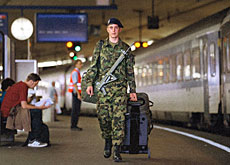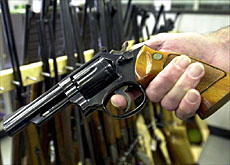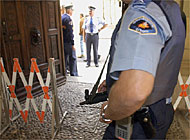Sale of army weapons triggers heated debate

In Switzerland, soldiers who have completed military service are allowed to hold on to their guns.
A legal loophole allows these weapons to be traded freely, causing embarrassment to the authorities and provoking protests from those who fear dire consequences.
A review of the present law promises tighter gun controls, but already the market is awash with ex-military rifles and pistols at knockdown prices.
A militia army – the principle, whereby every able-bodied man can be called on for national defence – still holds good in many countries, not only Switzerland.
But there is one thing that distinguishes Swiss militiamen from their counterparts elsewhere: a minor detail, normally hidden away in a wardrobe, the cellar or the attic of the family home.
Those who serve their country are issued, along with their uniforms and mess tin, with an assault rifle and, in some cases, a regulation pistol.
In earlier centuries, national defence was performed with shotguns, each citizen turning out with his own firearm. Today weapons are still kept at home, even though they are army property.
Private property
But when military service is over, even this restriction is lifted: a form is filled in and the soldier can keep his weapon for the rest of his life. The only safety measure is that the magazine is removed.
A survey carried out by the central barracks in Zurich revealed that 57 per cent of those who have completed their active service keep their rifles, while more than 75 per cent hold on to their pistols.
But the army is changing. From a strength of almost half a million men, the Swiss army is being reduced to little more than 100,000 active soldiers.
All militiamen up to the class of 1974 will be retired by the end of 2005. Last year, almost 120,000 soldiers left the service.
This means that, in just three years, at least 150,000 assault rifles and pistols will have become the private property of Swiss citizens; the official figure is a total of 324,484 weapons.
And they do not even need an official permit to carry arms, complain the critics. The relevant law, revised as recently as 1999, does not cover this aspect.
Federal Police Office spokesman Guido Balmer confirms this fact: “Article two of the law explicitly exempts the army from all restrictions on carrying arms.”
Weapons handed out by the national defence force – however out of date they may be – can therefore be owned and traded without restriction.
For sale!
A survey conducted by the “Tages-Anzeiger” newspaper reveals that a large proportion of ex-soldiers want to convert their end-of-service “present” into cash.
Many officially accredited arms dealers receive offers to sell on a daily basis. But military weapons are not particularly sought after by collectors, so they tend to fetch low prices.
“Whether or not the owners manage to sell their weapons privately, we have no idea. But in any case it is not illegal to do so,” says Balmer.
The spokesman points out that the intended reforms should close this loophole: one aim of the current review is to set up a database to register transfers of ownership of firearms.
“An important tool for investigators trying to trace a weapon used in committing a crime,” comments the justice ministry.
A wake-up call
But the Swiss Peace Council, an umbrella organisation of pacifist groups, has for some time denounced what it sees as a national scandal.
“The latent danger arising from the presence of hundreds of thousands of army weapons in the household setting is obvious,” it says. And yet the proposed review does not so much as mention imposing restrictions on the army and its practice of distributing private arsenals, the group complains.
The council sees the idea of a database as no more than a fig leaf to mask the interests of those promoting the free circulation of firearms.
The culprits – it says – are not only the big arms dealers. In Switzerland, there is also a long tradition of gun clubs and hunting, and those who shoot for sport have considerable political clout.
Gun lobby
For some years, the pacifists have been campaigning for strict limitations on small arms, and blame the gun lobby for Switzerland’s present permissive regime.
Analysts say organised criminals do not use Swiss military weapons, but the experts cannot deny that the abuse of such weapons is always possible.
In recent years there have been several incidents of homicidal gunmen going on the rampage. Massacres have occurred in a Zurich bank, in the parliament of canton Zug, and repeatedly in stressful household situations.
For now, at the Zurich barracks they simply hand out standard contracts for those contemplating selling their weapons, as a means of keeping tabs on firearms.
“It is a way of giving the owners of military weapons a sense of responsibility and encouraging reasonable behaviour,” says Balmer.
swissinfo, Daniele Papacella
324,484 assault rifles and other weapons are owned by former soldiers in Switzerland.
Between 1.2 and 3 million firearms are in circulation in Switzerland.
Officially, 16 weapons are registered for every 100 inhabitants.

In compliance with the JTI standards
More: SWI swissinfo.ch certified by the Journalism Trust Initiative











You can find an overview of ongoing debates with our journalists here . Please join us!
If you want to start a conversation about a topic raised in this article or want to report factual errors, email us at english@swissinfo.ch.